Related Research Articles

Ishmael Scott Reed is an American poet, novelist, essayist, songwriter, playwright, editor and publisher known for his satirical works challenging American political culture. Perhaps his best-known work is Mumbo Jumbo (1972), a sprawling and unorthodox novel set in 1920s New York.
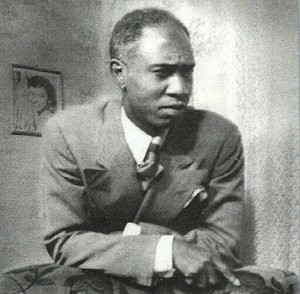
Melvin Beaunorus Tolson was an American poet, educator, columnist, and politician. As a poet, he was influenced both by Modernism and the language and experiences of African Americans, and he was deeply influenced by his study of the Harlem Renaissance.
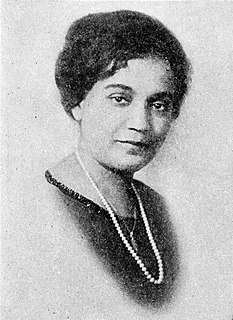
Jessie Redmon Fauset was an African-American editor, poet, essayist, novelist, and educator. Her literary work helped sculpt African-American literature in the 1920s as she focused on portraying a true image of African-American life and history. Her black fictional characters were working professionals which was an inconceivable concept to American society during this time Her story lines related to themes of racial discrimination, "passing", and feminism. From 1919 to 1926, Fauset's position as literary editor of The Crisis, a NAACP magazine, allowed her to contribute to the Harlem Renaissance by promoting literary work that related to the social movements of this era. Through her work as a literary editor and reviewer, she discouraged black writers from lessening the racial qualities of the characters in their work, and encouraged them to write honestly and openly about the African-American race. She wanted a realistic and positive representation of the African-American community in literature that had never before been as prominently displayed. Before and after working on The Crisis, she worked for decades as a French teacher in public schools in Washington, DC, and New York City. She published four novels during the 1920s and 1930s, exploring the lives of the black middle class. She also was the editor and co-author of the African-American children's magazine The Brownies' Book. She is known for discovering and mentoring other African-American writers, including Langston Hughes, Jean Toomer, Countee Cullen, and Claude McKay.

Arna Wendell Bontemps was an American poet, novelist and librarian, and a noted member of the Harlem Renaissance.

Gwendolyn B. Bennett was an American artist, writer, and journalist who contributed to Opportunity: A Journal of Negro Life, which chronicled cultural advancements during the Harlem Renaissance. Though often overlooked, she herself made considerable accomplishments in art, poetry, and prose. She is perhaps best known for her short story "Wedding Day", which was published in the magazine Fire!! and explores how gender, race, and class dynamics shape an interracial relationship. Bennett was a dedicated and self-preserving woman, respectfully known for being a strong influencer of African-American women rights during the Harlem Renaissance. Throughout her dedication and perseverance, Bennett raised the bar when it came to women's literature and education. One of her contributions to the Harlem Renaissance was her literary acclaimed short novel Poets Evening; it helped the understanding within the African-American communities, resulting in many African Americans coming to terms with identifying and accepting themselves.

Louise Alone Thompson Patterson was an American social activist and college professor. Thompson was acquainted with many of the leading literary figures during the Harlem Renaissance of the 1920s and 1930s, spending most of her life involved in civil rights. Thompson Patterson is also known as one of the first black women to be enrolled into the University of California at Berkeley.
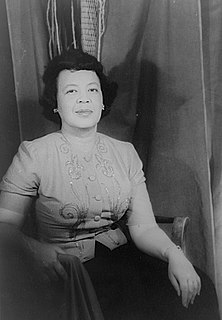
Margaret Allison Bonds was an American composer, pianist, arranger, and teacher. One of the first Black composers and performers to gain recognition in the United States, she is best remembered today for her popular arrangements of African-American spirituals and frequent collaborations with Langston Hughes.
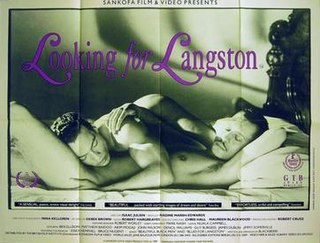
Looking for Langston is a 1989 British black-and-white film, directed by Isaac Julien and produced by Sankofa Film & Video Productions. It combines authentic archival newsreel footage of Harlem in the 1920s with scripted scenes to produce a non-linear impressionistic storyline celebrating black gay identity and desire during the artistic and cultural period known as the Harlem Renaissance in New York. The film has a runtime of about 42 minutes.

Essex Hemphill was an openly gay American poet and activist. He is known for his contributions to the Washington, D.C. art scene in the 1980s, and for openly discussing the topics pertinent to the African-American gay community.
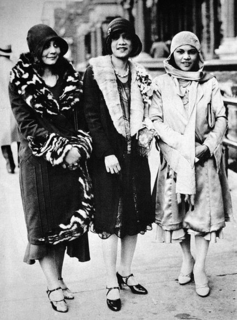
The Harlem Renaissance was an intellectual and cultural revival of African American music, dance, art, fashion, literature, theater, politics and scholarship centered in Harlem, Manhattan, New York City, spanning the 1920s and 1930s. At the time, it was known as the "New Negro Movement", named after The New Negro, a 1925 anthology edited by Alain Locke. The movement also included the new African American cultural expressions across the urban areas in the Northeast and Midwest United States affected by a renewed militancy in the general struggle for civil rights, combined with the Great Migration of African American workers fleeing the racist conditions of the Jim Crow Deep South, as Harlem was the final destination of the largest number of those who migrated north.
Hans Ansgar Ostrom is an American professor, writer, editor, and scholar. Ostrom is a Professor of African American Studies and English the University of Puget Sound (1983–present), where he teaches courses on African-American literature, creative writing, and poetry as a genre. He is known for his authorship of various books on African-American studies and creative writing, and novels including Three to Get Ready, Honoring Juanita, and Without One, as well as The Coast Starlight: Collected Poems 1976–2006.
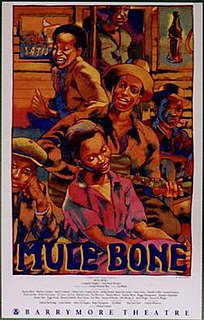
Mule Bone: A Comedy of Negro Life is a 1930 play by American authors Langston Hughes and Zora Neale Hurston. The process of writing the play led Hughes and Hurston, who had been close friends, to sever their relationship. Mule Bone was not staged until 1991, when it was produced in New York City by the Lincoln Center Theater.

James Mercer Langston Hughes was an American poet, social activist, novelist, playwright, and columnist from Joplin, Missouri. One of the earliest innovators of the literary art form called jazz poetry, Hughes is best known as a leader of the Harlem Renaissance. He famously wrote about the period that "the Negro was in vogue", which was later paraphrased as "when Harlem was in vogue."
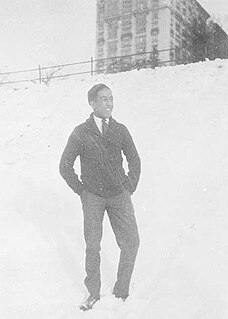
"The Negro Speaks of Rivers" is a poem by American writer Langston Hughes. Hughes wrote the poem when he was 17 and crossing the Mississippi River on the way to visit his father in Mexico. It was first published the following year in The Crisis, starting Hughes's literary career. "The Negro Speaks of Rivers" uses rivers as a metaphor for Hughes's life and the broader African-American experience. It has been reprinted often and is considered one of Hughes's most famous and signature works.
Lewis Grandison Alexander was an American poet, actor, playwright, and costume designer who lived in Washington, D.C. and had strong ties to the Harlem Renaissance period in New York. Alexander focused most of his time and creativity on poetry, and it is for this that he is best known.

Uhuru Afrika is an album by American jazz pianist Randy Weston recorded in 1960 and originally released on the Roulette label. The album features lyrics and liner notes by the poet Langston Hughes and was banned in South Africa in 1964, at the same time as was Lena Horne's Here's Lena Now!, with copies of the albums being seized in Johannesburg and Cape Town.
Trudier Harris is an American literary historian and author at the University of Alabama. She was the J. Carlyle Sitterson Distinguished Professor at University of North Carolina at Chapel Hill.
Rites and Reason Theatre is a theater within the Africana Studies department of Brown University in Providence, Rhode Island. It was founded in 1970 by Professor George Houston Bass, and is one of the longest-running continuously producing black theaters in the United States. Writers for the theater have included Ossie Davis, Ruby Dee, and Adrienne Kennedy. The theatre serves to develop theatrical and visual performance works that articulate and understand the expansive African Diaspora.
George Houston Bass (1938–1990) was an American playwright, director and writer. He lived and worked in Providence, Rhode Island. He founded the Rites and Reason Theater at Brown University in September 1970. He was also the literary secretary to and the executor of the literary estate of poet Langston Hughes. Bass founded the Langston Hughes Society in 1981 and the society's publication, the Langston Hughes Review, in 1982.
"Harlem" is a poem by Langston Hughes. These eleven lines ask, "What happens to a dream deferred?", providing reference to the African-American experience. It was published as part of a longer volume-length poem suite in 1951 called Montage of a Dream Deferred, but is often excerpted from the larger work. The play A Raisin in the Sun was titled after a line in the poem.
References
- ↑ Kinzer, Stephen (2002-02-14). "For a Poet, Centennial Appreciation". New York Times. Retrieved 2009-04-01.
- ↑ "George Houston Bass, Theater Professor, 52". New York Times. 1990-09-21. Retrieved 2009-04-01.
- ↑ Dolan Hubbard, "Langston Hughes Society", Organizing Black America: An Encyclopedia of African American Associations.